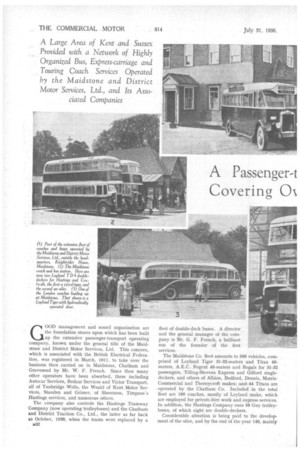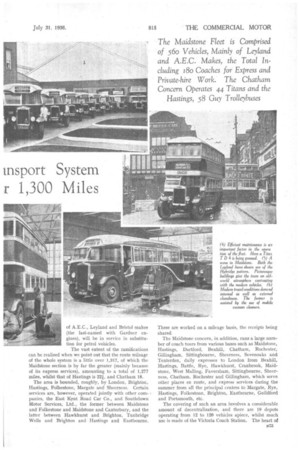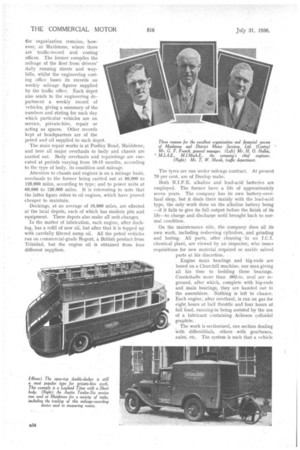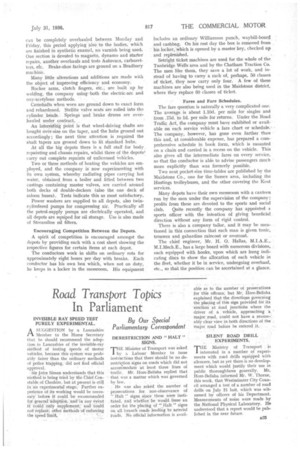A Passenger-t tnsport System
Page 38

Page 39

Page 40

Page 41

If you've noticed an error in this article please click here to report it so we can fix it.
r 1,300 Miles Covering ON GOOD management and sound organization are the foundation stones upon which has been built up the extensive passenger-transport operating company, known under the general title of the Maidstone and District Motor Services, Ltd. This concern, which is associated with the British Electrical Federation, was registered in March, 1911, to take over the business then carried on in Maidstone, Chatham and Gravesend by Mr. W. F. French. Since then many other operators have been absorbed, these including Autocar Services, Redcar Services and Victor Transport, all of Tunbridge Wells, the Weald of Kent Motor Services, Standen and Grimer, of Sheerness, Timpson's Hastings services, and numerous others.
The company also controls the Hastings Tramway Company (now operating trolleybuses) and the Chatham and District Traction Co., Ltd., the latter as far back as October, 1930, when the trams were replaced by a
A : 3 2
fleet of double-deck buses. A director and the general manager of the company is Mr. G. F. French, a brilliant son of the founder of the first services.
The Maidstone Co. fleet amounts to 560 vehicles, comprised of Leyland Tiger 31-32-seaters and Titan 48seaters, A.E.C. Regent 48-seaters and Regals for 31-32 passengers, Tilling-Stevens Express and Gifford singledeckers, and others of Albion, Bedford, Dennis, Morris Commercial and Thornycroft makes; and 44 Titans are operated by the Chatham Co. Included in the total • fleet are 180 coaches, mostly of Leyland make, which are employed for private-hire work and express services. In addition, the Hastings Company runs 58 Guy trolleybuses, of which eight are double-deckers.
Considerable attention is being paid to the development of the oiler, and by the end of the year 140, mainly of A.E.C. Leyland and Bristol makes (the last-named with Gardner engines), will be in service in substitution for petrol vehicles.
The vast extent of the ramifications can be realized when we point out that the route mileage of the whole system is a little over 1,317, of which the Maidstone section is by far the greater (mainly because of its express services), amounting to a total of 1,277 miles, whilst that of Hastings is 22k, and Chatham 18.
The area is bounded, roughly, by London, Brighton, Hastings, Folkestone, Margate and Sheerness. Certain services are, however, operated jointly with other companies, the East Kent Road Car Co., and Southdown Motor Services, Ltd., the former between Maidstone and Folkestone and Maidstone and Canterbury, and the latter between Hawkhurst and Brighton, Tunbridge Wells and Brighton and Hastings and Eastbourne. These are worked on a mileage basis, the receipts being shared.
The Maidstone concern, in addition, runs a large number of coach tours from various bases such as Maidstone, Hastings, Dartford, Bexhill, Chatham, Rochester, Gillingham, Sittingbourne, Sheerness, Sevenoaks and Tenterden, daily expresses to London from Bexhill, Hastings, Battle, Rye, Hawkhurst, Cranbrook, Maidstone, West Mailing, Faversham, Sittingbourne, Sheerness, Chatham, Rochester and Gillingham, which serve other places en route, and express services during the summer from all the principal centres to Margate, Rye, Hastings, Folkestone, Brighton, Eastbourne, Guildford and Portsmouth, etc.
The covering of such an area involves a considerable amount of decentralization, and there are 19 depots operating from 12 to 120 vehicles apiece, whilst much use is made of the Victoria Coach Station. The heart of
the organization remains; however, at Maidstone, where there are traffic-record and costing offices. The former compiles the mileage of the fleet from drivers' daily 'running sheets and waybills, Whilst the engineering costing office bases its records on weekly mileage figures supplied by the traffic office. Each depot also sends to the engineering department a weekly record of vehicles, giving a summary of the numbers and stating for each day which particular vehicles are on service, private-hire, repair or acting as spares. Other .records kept at headquarters aro of the petrol and, oil supplied to each depot.
The main repair works is at Postley Road, Maidstone, and here all major overhauls to body and chassis are carried out. Body overhauls and repaintings am executed at periods varying from 10-15 months, according to the type of body, its condition and mileage.
Attention to chassis and engines is on a mileage basis, overhauls to the former being carried out at 80,000 to 120,000 miles, according to type; and to power units at 60,000 to 120,000 miles. It is interesting to note that the latter figure refers to oil engines, which have proved cheaper to maintain.
Dockings, at an average of 10,000 miles, are effected at the local depots, each of which has modern pits and equipment. These depots also make all unit changes.
In the matter of lubrication, each engine, after docking, has a refill of new oil, but after that it is topped up with carefully filtered sump oil. All the petrol vehicles run on commercial-grade Regent, a British product from Trinidad, but the engine oil is obtained from four different suppliers.
The tyres are run under mileage contract. At present 70 per cent. are of Dunlop make.
Both N.I.F.E. alkaline and lead-acid batteries are employed. The former have a life of approximately seven years. The company has its own battery-overhaul shop, but it deals there mainly with the lead-acid type, the only work done on the alkaline battery being —if it fails to give its full output before the finish of its life—to charge and discharge until brought back to normal condition.
On the maintenance side, the company does all its own work, including resleeving cylinders, and grinding and boring. All parts, after cleaning in an I.C.I. chemical plant, are viewed by an inspector, who issues requisitions for new material required or usable salved parts at his discretion.
Engine main bearings and big-ends are bored on a Churchill machine, one man giving all his time to bedding these bearings. Crankshafts more than .002-in, oval are reground, after which, complete with big-ends and main bearings, they are handed out to the assemblers. Nothing is left to chance. Each engine, after overhaul, is run on gas for eight hours at half throttle and four hours at full load, running-in being assisted by the use of a lubricant containing Acheson colloidal graphite.
The work is sectionized, one section dealing With differeritiais, others with gearboxes, axles, etc. The system, is such that a vehicle can be completely overhauled between Monday and Friday, this period applying also to the bodies, which are finished in synthetic enamel, no varnish being used. One section is devoted to. -magneto, dynamo and starter repairs, another overhauls and tests Autovacs, carburetters, efc. Brake-shoe facings are ground on a Bradbury machine.
Many little alterations and additions are made with the object of improving efficiency and economy.
Rocker arms, clutch fingers, etc., are built up by welding, the company usingboth the electric-arc and oxy-acetylene methods.
Camshafts when worn are ground down to exact form and rehardenecl. SteHite valve .seats are rolled into th.e cylinder hea. cis.. Springs . and brake drums are overhauled under contract..
An An interesting point is that wheel-driving shafts are bought over-size on the taper, and the hubs ground out accordingly ; the next time attention is required the shaft tapers are ground down to fit standard hubs.
At all the big depots there is a full staff for body repainting and chassis repairs, whilst three of the depots' carry out complete repaints of unlicensed vehicles_ Two or three methods of heating the vehicles are employed, and the company is now experimenting with its own system, whereby radiating pipes carrying hot water, obtained from a boiler and fitted between two castings containing master valves, are carried around both decks of double-deckers (also the one deck of saloon buses). Tests indicate this as most satisfactory.
Power washers are supplied to all depots, also twincylindered pumps for compressing air. Practically all the petrol-supply pumps are electrically operated, and all depots are equiped for oil storage. Use is also made of Streamline oil filters.
Encouraging Competition Between the Depots.
A spirit of competition is encouraged amongst the depots by providing each with a cost sheet showing the respective figures for certain items at each depot. The conductors work in shifts on ordinary rota for approximately eight hours per 'clay with breaks. Each conductor has his own box which, when not on duty, he keeps in a locker in the messroom. His equipment
includes an ordinary Williamson punch, waybill-board and cashbag. On his rest day the box is removed from his locker,, which is opened by a master key, checked up and replenished.
Setright ticket machines are used for the whole of the Tunbridge Wells area and by the Chatham Traction Co. The men like them, they save a lot of work, and instead of having to carry a rack of, perhaps, 50 classes of ticket, they now carry only four. A few of these machines are also being used in the Maidstone district, where they replace GO classes of ticket.
Fares and Fare Schedules.
The fare question is naturally a very complicated one. The average is about 1.10d. per mile for singles and from .75d. to id. per mile for returns. Under the Road Traffic Act, the company must have exhibited or available on each service vehicle a fare chart or schedule.. The company, however, has gone even further than this and, at considerable expense, has prepared a comprehensive schedule in hook form, which is mounted on a chain and carried in a recess on the vehicle. This also gives all the intermediate fares on every service, so that the conductor is able to advise passengers much more explicitly than was formerly possible.
Two neat pocket-size time-tables are published by the Maidstone Co., one for the Sussex area, including the Hastings trolleybuses, and the other covering the Kent services.
Many depots have their own messroorn with a canteen run by the men under the supervision of the company ; profits from these are devoted to the sports and social club. Quite recently the company has appointed a sports officer with the intention of giving beneficial direction without any form of rigid control.
There is also a company tailor, and it may be mentioned in this connection that each man is given tunic, trousers and gabardine raincoat or overcoat.
The chief engineer, Mr. H. 0. Hallas,
M.I.Mech.E., has a large board with numerous divisians, each equipped with hooks, upon which are hung indicating discs to show the allocation of each vehicle in the fleet, whether it be in service, undergoing overhaul, etc., so that the position can be ascertained at a glance.












































































